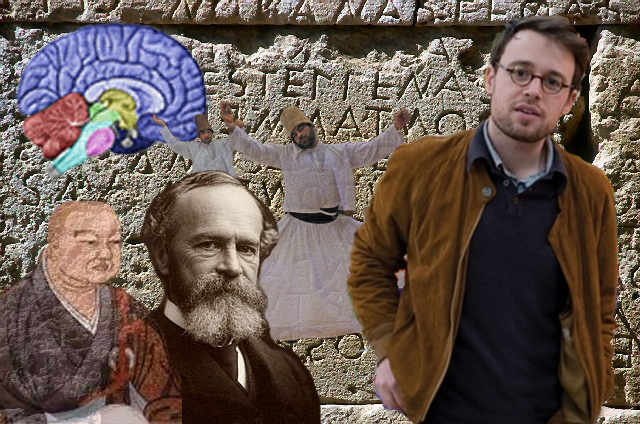You have no items in your cart. Want to get some nice things?
Go shopping
In his classic textbook on The Principles of Psychology (1890), William James famously claimed: “Everyone knows what attention is.” That hasn’t stopped the emergence of an academic cottage industry of studies into attention, by cognitive psychologists, neuroscientists, educationalists and, now, the postmodernist novelist Joshua Cohen, whose own hyperkinetic prose is symptomatic of a literary permutation of Attention Deficit Hyperactivity Disorder. His most successful novel yet, Witz, with its exhausting shtick of cascading, Kafkaesque clauses, is a trial of attention-holding. It should come as no surprise that the three-time novelist should now turn his attention to that very subject.
He began his talk at the LRB bookshop, as he begins the book itself, with William James’s well-worn definition of attention: “the taking possession of the mind, in clear and vivid form, of one out of what seem several simultaneously possible objects or trains of thought.” Already failing to hold his attention, Cohen, however, was more interested in James’s definition of its opposite, “the confused, dazed, scatterbrained state which in French is called distraction”. Curiously enough, his brother Henry, in his novel The Tragic Muse – also from 1890 – likewise alights on the Gallic character of ‘distraction’: “a new distraction, in the French sense, was what he flattered himself he had discovered.” And of course this fact, this sibling symmetry, is nothing more than a distraction from the subject at hand.
Cohen’s contempt for that subject soon became apparent. “I hate attention!”, he declared with gusto, adding: “Of course, you hate what you cannot hold.” He seemed fittingly ill at ease even talking about it, his bespectacled eyes literally lacking the “focalisation” William James defined as an attribute of attention. One gathered that his book is a sort of masochistic act of love, whose seminal result is a meditation on attention that, in fact, says more about attention when not paying attention to it, his Tristram Shandy-esque digressions a poetic pointer to the nowadays unattainable state of attentivity, or “apperception”. Cohen is fascinated by the soupçon of the brothers James that, precisely in 1890, distraction was still seen as “French”. Now, of course, in the age of the internet’s myriad possibilities, we have all become French, distraction the modern malaise.
In both his talk and his book, Cohen is too distracted to see the real significance of both James’ statements and the year they made them. Writing on the cusp of modernism’s efflorescence in the years to come, they were anticipating a movement that would, in part, be defined by that malaise, the futile search for meaning, the inability to find certainty among a multiplicity of competing sources, scriptures, narratives – Kafka’s long, tortured letters are not merely a matter of writer’s block, but a manifestation of the spirit of the age, the inability to focus, to focalise.
Cohen is almost there, typically remarking on its corollary instead, the frenzied state of attention to be come by in the premodern practices of all religions, from Zen to the zikr of the Sufis, the repetition of holy words, mantras, the attention of yeshiva students as they bob back and forth memorising meanings of words possessing absolute certainty. No wonder the first definition of ‘attention’ in English, by William Bonde in 1526, runs: “Attencion or intencion for our purpose here is onely the attendaunce study & diligence that man or woman gyveth to their dede as prayer.” Cohen’s theological erudition is a much-needed counterpoint to the philistine dismissal of that tradition in contemporary letters, only just recovering from the late Hitchens low point, Cohen’s wry dismissal of which (“If you’re averse to religion, skip directly to chapter 4”) is well taken.
That evening Cohen’s wide-ranging, hyperkinetic patter, only a little less barnstorming in person than in prose, threw up some resonant contemporary criticism, like his relation of the rise of attention-related psychometric studies to our broader capitalist climate. Psychologists’ construction of an entirely artificial commodity known as the ‘attention span’ represents, for Cohen, nothing less than the commodification of time itself. An artificial commodity can be manipulated to induce an artificial scarcity and in the ensuing marketplace attention can be purchased and bargained for, an abomination that admittedly resonated with the LRB audience more than it actually made sense.
This was often the case, but it matters little. The thrill consists in keeping up (he confessed that at least half of the book was written while on psychostimulants “both legal and illegal”); if you catch him out the thrill is all the greater. Cohen was distracted by arcane histories of writing systems, noting ancient South Arabic’s boustrophedon style, or “cow-path writing”, where lines alternate left-to-right and right-to-left. But the art of Cohen’s own meandering, boustrophedon digression lay either in a poetic truth about attention, at the very least about its amorphous ungraspability (“attentio” is Latin for “to grasp”) or, miraculously, bringing the digression back home. So after riffing on Semitic stone-chiselling, he explained that the Greek “stilus”, the pen avant la lettre, meant merely a “marker”. This became the Latin “stimulus”. What Greek understood as an instrument for marking, Latin understood as meriting attention. If Witz has already marked out his name, Attention shows he merits attention. Joshua Cohen is nothing less than a modern magus of free association, the very doyen of distraction. In the French sense, of course.




